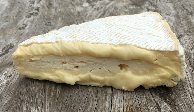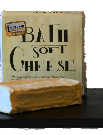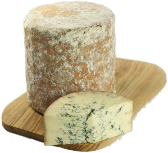OGLESHIELD
Country of Origin: British Isles
Milk Variety: Cows'
Style of Cheese: Hard
Milk: Unpasteurised
Jamie M ontgomery has long had a herd of Jersey cows on his farm but found their rich, buttery milk unsuitable for Cheddar making. Instead, a new recipe was developed. The cheese was named Shield after an ancient bronze shield that was unearthed nearby. The area is steeped in history and is reputed to be one of the possible sites for Camelot. The resulting cheese was good but still seemed to lack a little something. Bill Oglethorpe came up with the idea of washing the rind to retain more moisture in the cheese and to develop more meaty, savoury flavours. The resulting cheese has a more supple texture and a fuller, earthier flavour. It also melts beautifully and makes a delicious British alternative to Raclette.
ontgomery has long had a herd of Jersey cows on his farm but found their rich, buttery milk unsuitable for Cheddar making. Instead, a new recipe was developed. The cheese was named Shield after an ancient bronze shield that was unearthed nearby. The area is steeped in history and is reputed to be one of the possible sites for Camelot. The resulting cheese was good but still seemed to lack a little something. Bill Oglethorpe came up with the idea of washing the rind to retain more moisture in the cheese and to develop more meaty, savoury flavours. The resulting cheese has a more supple texture and a fuller, earthier flavour. It also melts beautifully and makes a delicious British alternative to Raclette.
RENEGADE MONK
Origin: Somerset
Producer: Feltham's Farm
Style: Soft
Milk Type: Organic cow's milk
A delicious soft mildly blue cheese made from organic cow's milk, with a mild flavour. 'Drunkenly washed in ale' -
SAINT NECTAIRE
Size 1.5kg
Region: Auvergne
Style: Soft
Milk type: Unpasteurised Cow
 Our Saint Nectaire comes from the ripening rooms of affineur Xavier Morin. Xavier is more than French, he is from Cantal. He is a passionate advocate of the cheeses from Cantal and the Auvergne, where some of France’s oldest and most famous cheeses are produced.
Our Saint Nectaire comes from the ripening rooms of affineur Xavier Morin. Xavier is more than French, he is from Cantal. He is a passionate advocate of the cheeses from Cantal and the Auvergne, where some of France’s oldest and most famous cheeses are produced.
Xavier works in complete partnership with each individual cheese maker. He knows their animals, their challenges and the cheese making process inside out. We are fortunate indeed to be one of Xavier’s special customers.
Our Saint Nectaire is made from the milk of the now rare breed of Salers cow native to the Auvergne region of France. The Salers are robust and even-
SHARPHAM RUSTIC GARLIC AND HERB
County: Devon
Cheese-
Farm: Sharpham Estate
Style: Semi-
Milk Type: U, Jersey Cow
Age: 10 weeks
Vegetarian
 Rustic is made on the Sharpham Estate, which overlooks the slopes of the River Dart, downstream from Totnes in Devon. The estate has a vineyard, dairy and creamery, where they have been producing wine and cheese for over twenty years.
Rustic is made on the Sharpham Estate, which overlooks the slopes of the River Dart, downstream from Totnes in Devon. The estate has a vineyard, dairy and creamery, where they have been producing wine and cheese for over twenty years.
The milk is taken from their herd of Jersey cows, and it is particularly rich and creamy. The cheese was originally made in the coach yard next to the house, but, in April 2003, cheese-
Sharpham Rustic has an elliptical shape (rather like Pecorino), a deep golden curd, and a rich savoury flavour. It is a wonderful example of a talented cheese-
The idea of fresh chives and wild garlic came from the cows themselves. As they chewed on wild garlic while grazing in the water meadows, there was an unmistakable taint in the milk. However, as the flavour was so good, the idea of adding garlic to the cheese was born.
SLACK-
Full fat soft cheese made with pasteurised cows' milk and non-
History: Slack-
SPARKENHOE RED LEICESTER
County: Leicestershire
Cheese makers: David & Jo Clarke
Style: Hard
Milk Type: U, Cow
Age: 4 months +
 David and Jo Clarke are dairy farmers who run one of the country’s top herds of pedigree Holstein-
David and Jo Clarke are dairy farmers who run one of the country’s top herds of pedigree Holstein-
When they decided to revive the tradition of cheese-
In the end, it was David and Jo’s desire to re-
So, in 2005, armed with an old recipe and having completed a cheese-
The name Sparkenhoe has historical significance, in that it is an old Leicestershire term meaning ‘gorsey nob’.It is also the name for the ‘hundred area’ in which the farm is situated.
TALEGGIO
Country: Italy
Area: Mario Costa novara
A mellow, supple and fruity cheese, it has a crumpled,
sometimes sticky skin (often speckled with green and grey
moulds), a yielding texture, and a flavour that is soft and
buttery. The cheese melts beautifully into pasta and risotto,
and elevates the humble toastie to grand new heights.
VINTAGE LINCOLNSHIRE POACHER
Simon and Tim Jones make this cheese on their family farm from the milk of their own dairy herd.
A unique cross between a cheddar and an Alpine recipe gives the cheese a fine balance of savoury to sweet tones,
Matured for around 18 months gives the cheese a greater depth and complexity.
WESTCOMBE CHEDDAR &
WESTCOMBE CHEDDAR HAND SELECTED
County: Somerset
Cheese-
Farm: Lower Westcombe
Farm Style: Hard
Milk: U, Cow
Age: 12 months +, 14 months +
 Cheese has been made at Westcombe since the 1890s and they now remain as one of the last three traditional producers of Somerset Cheddar. They have the status of PDO but the Calvers are one of the last three families, along with Jamie Montgomery and the Keens to make traditional Artisan Somerset Cheddar. The criteria for this is much stricter than that for West Country Farmhouse Cheddar, and includes using raw milk from their own herd, pint starters rather than the more widely used powdered versions, and animal rennet. The cheese must never be made in a block form, and must be cloth-
Cheese has been made at Westcombe since the 1890s and they now remain as one of the last three traditional producers of Somerset Cheddar. They have the status of PDO but the Calvers are one of the last three families, along with Jamie Montgomery and the Keens to make traditional Artisan Somerset Cheddar. The criteria for this is much stricter than that for West Country Farmhouse Cheddar, and includes using raw milk from their own herd, pint starters rather than the more widely used powdered versions, and animal rennet. The cheese must never be made in a block form, and must be cloth-
Together with Tom Calver, Ruth Raskin, our Cheese Quality Manager has been hand selecting Cheddar from Westcombe Dairy. Under Tom’s watchful eye, the chosen cheeses are then matured for longer to allow a deeper, fuller flavour to develop. Only those cheeses that have the perfect flavour profile are selected to be matured on. This Cheddar has a wonderfully full and savoury flavour with a slight tang.
WIGMORE
County: Berkshire
Cheese-
Farm: Village Maid Dairy
Style: Soft
Milk Type: U, Ewe
Age: 4 – 6 weeks
Vegetarian
Anne Wigmore began making cheese in the experimental dairy at the National Institute for Research in
Dairying (NIRD) in 1984, having worked there previously for a number of years as a microbiologist. Soon
afterwards, she decided to set up on her own, and, in 1986, Village Maid Dairy was born in a converted
building at the end of her garden. Anne’s knowledge of cheese-
Wigmore is the sister cheese to Waterloo. They are both washed curd cheeses, which means that an amount of whey is replaced with water during the make, so leading to a gentle, delicate flavour and a smooth texture.
Do not imagine this creates a bland cheese though. Wigmore is complex and fruity, and rich and unctuous, with a great delicacy of taste and texture.In the late 90s Chris was not well. Production shifted to a nearby farm, Westcombe Dairy, complete with the original brining tank and 20-
WYFE OF BATH
County: Somerset
Cheese-
Farm: Park Farm, Kelston
Style: Semi-
Milk Type: P, Organic Cow 
Age: 3-
Vegetarian
of Bath is made with organic cows' milk, from a recipe inspired by Gouda, by Graham Padfield at Park Farm in the village of Kelston, on the outskirts of the historic city of Bath. Cheese is at the heart of the family business, and they have recently built a new dairy to accommodate the high demand for their cheese. Everything is still made by hand, and the quality of the milk is paramount. Graham uses the organic milk from his own herd of Holstein Friesian cows to make the cheese, which is formed in a basket mould before being aged for four months for a rich, deep flavour. As a hand-
Wyfe of Bath takes its name from the tale of a character in the 14th Century British literary classic, The Canterbury Tales by Geoffrey Chaucer. Using the old English spelling of ‘wife’, the tale is told by a lusty character with strong appetites!
We have a continually changing range of specially selected cheeses available in our Kilwardby Street shop. Please come in and see our range.
CHEESE PLATTERS
Choose 4 or 6 cheeses from our range of specially selected cheeses and they will be presented on a slate platter. (Subject to availability)
The deluxe option is the 4 or 6 cheese patter plus either a 37.5cl or 70cl bottle of port.







APPLEBY’S CHESHIRE
County: Cheshire
Cheese-
Farm: Appleby’s of Hawkstone
Style: Hard
Milk Type: R, Cow
 In 1952, Lucy Appleby decided to revive one of England’s great cheeses: cloth-
In 1952, Lucy Appleby decided to revive one of England’s great cheeses: cloth-
BARON BIGOD
Milk: Cows'
Style: Soft
Milk: Unpasteurised
 Baron Bigod is a stunning brie-
Baron Bigod is a stunning brie-
Jonny’s family has been farming the land here for three generations, but it was only recently that Jonny decided it was time to make some radical changes.He wanted to start selling raw milk, and to move into making the best raw milk cheese that he could. But raw milk and fine cheese need the best raw ingredients, and the family’s herd of Friesians weren’t really the best place to start.
So Jonny set off to France in search of cows that could produce the highest quality milk available. He chose Montbeliarde, the cows whose high protein milk is used for some of the famous French cheeses such as Comté and Vacherin Mont d’Or. He brought his ladies back to Suffolk, and set about building up his herd by cross-
Great milk deserves the utmost respect, and Jonny’s perfectionism in choosing his herd is matched by his approach to cheese-
If you choose to purchase a whole, 1kg Baron Bigod cheese, you will receive it hand-
BATH BLUE
County: Somerset
Cheese-
Farm: Park Farm, Kelston
Style: Blue
Milk: P, Organic Cow
Age: 8 -
 Nestled in the Mendip Hills on the out skirts of Bath, Park Farm has been home to the Padfield Family for three generations. Graham’s grandmother once made Cheddar on the farm. However cheese-
Nestled in the Mendip Hills on the out skirts of Bath, Park Farm has been home to the Padfield Family for three generations. Graham’s grandmother once made Cheddar on the farm. However cheese-
BATH SOFT
County: Somerset
Cheese-
Farm: Park Farm, Kelston
Style: Soft
Milk: P, Organic Cow
Age: 4-
 A mild and creamy, organic, brie-
A mild and creamy, organic, brie-
Three generations of the Padfield family have farmed the land around Kelston Manor, near Bath.
It was Graham Padfield who re-
It was a cheese recommended to Lord Admiral Nelson by his father in 1801. Graham uses the organic milk of his own Friesian cows. The resulting cheese is mild, creamy and delicate.
COLSTON BASSETT STILTON
County: Nottinghamshire
Cheese-
Dairy: Colston Bassett and District
Style: Blue
Milk Type: P, Cow,
Age: 12 weeks +
Vegetarian
 Hand-
Hand-
Local milk is left to set under the watchful eye of Billy Kevan, only the fourth head cheese-
After four to six weeks and again one week later, Colston Bassett Stilton is pierced to allow air to get in, so that the blue veins can develop.
Stilton’s origins date back to the 18th century when it was eaten at The Bell Inn, Stilton. Now a protected cheese, Stilton can only be made in the counties of Nottinghamshire, Derbyshire and Leicestershire. Colston Bassett Stilton is often considered to be the best. Little has changed since they started making cheese in 1913, and they still use the milk from four of the original local farms that set up the co-
DUCKETT’S CAERPHILLY
County: Somerset
Cheese-
Farm: Westcombe
Style: Hard
Milk Type: U, Cow
Age: 2 months
 Made by Tom Calver at Westcombe Dairy. The recipe was handed down to them from Chris Duckett, a third generation Caerphilly maker.
Made by Tom Calver at Westcombe Dairy. The recipe was handed down to them from Chris Duckett, a third generation Caerphilly maker.
Traditionally a Welsh cheese, Somerset farmers began making it in the early 1800s when demand exceeded supply in Wales. Many cheddar makers decided to make this product as it is matured for around 8 weeks, rather than the year for farmhouse cheddar. Like many of ‘the crumblies’ it is an acidic, lactic make with a crumbly interior.
When many farmers turned away from making unpasteurised Caerphilly with a natural rind, Chris Duckett’s family continued on. He became the last traditional producer of unpasteurised farmhouse Caerphilly in the UK.
In the late 90s Chris was not well. Production shifted to a nearby farm, Westcombe Dairy, complete with the original brining tank and 20-
KIRKHAM’S LANCASHIRE
County: Lancashire 

Cheese-
Farm: Beesley
Style: Hard
Milk Type: U, Cow
Age: 2 -
Vegetarian
 A traditional, crumbly, unpasteurised Lancashire, with a wonderfully moist, pressed texture, and a mellow tang. Graham Kirkham makes traditional, crumbly Lancashire at Goosnargh. The milk for the cheese comes from their own herd of Friesian cows. The cheese is made over 3 days using a third of the curd from each day of cheese making. The cheese is then cloth bound and rubbed with the traditional butter, which allows the cheese to breathe and develop and matured from 2-
A traditional, crumbly, unpasteurised Lancashire, with a wonderfully moist, pressed texture, and a mellow tang. Graham Kirkham makes traditional, crumbly Lancashire at Goosnargh. The milk for the cheese comes from their own herd of Friesian cows. The cheese is made over 3 days using a third of the curd from each day of cheese making. The cheese is then cloth bound and rubbed with the traditional butter, which allows the cheese to breathe and develop and matured from 2-
The Kirkhams have been making cheese for 3 generations. Graham learned to make cheese from his mother who now helps her husband to milk the cows. The Kirkhams are the last makers of traditional Lancashire. The three day curd method comes from the days where farmers only had a few cows and it would take 3 days to get enough curd to fill one cheese mould.
The flavour of the unpasteurised milk and the buttered muslin rind produces a rich and complex white Lancashire which melts in the mouth. It also creates the desired “buttery crumble” and is clean and lactic in flavour. It also makes the connoisseurs' cheese on toast, because it bubbles rather than melts.In the late 90s Chris was not well. Production shifted to a nearby farm, Westcombe Dairy, complete with the original brining tank and 20-
MANCHEGO CURADO
Origin: La Mancha
Producer: L Oveja Negra
Style: Hard
Milk Type: U, Ewe
Age: 6 months +
 On the dry plateau of La Mancha (translates as ‘land without water’) Spain’s most famous cheese can be found. Cheese-
On the dry plateau of La Mancha (translates as ‘land without water’) Spain’s most famous cheese can be found. Cheese-
Manchego has become such a popular cheese worldwide that its production is increasingly industrial.
At The Fine Cheese Co., we have been on a mission to source and supply a true, artisan Manchego: one that defines the style, and is the Manchego of both our memory and our dreams.
That search is over. La Oveja Negra Manchego Curado is made by the Parra family on their organic farm, from the milk of their rare breed Oveja Negra (black sheep). Modern Manchego is invariably made from the larger white breed which provides higher yields. The hardy little black ewes may produce less milk, but the quality is superb giving the cheese a complex, sweet, nutty and herbaceous flavour. From 6 months, as the cheese is losing moisture, the interior becomes more compact and less open and springy while the flavour intensifies.
MERRY WYFE
An award-
 This cheese has a distinctive pungent orange (edible) rind and a rich, creamy texture typical of our cheeses; a beautiful addition to our range.
This cheese has a distinctive pungent orange (edible) rind and a rich, creamy texture typical of our cheeses; a beautiful addition to our range.
Only launched in May 2017, the “Merry Wyfe” has already won gold at three cheese awards: The World Cheese Awards, the Artisan Cheese Awards at Melton Mowbray and the Global Cheese Awards at Frome.
It is an organic, pasteurised and vegetarian cheese